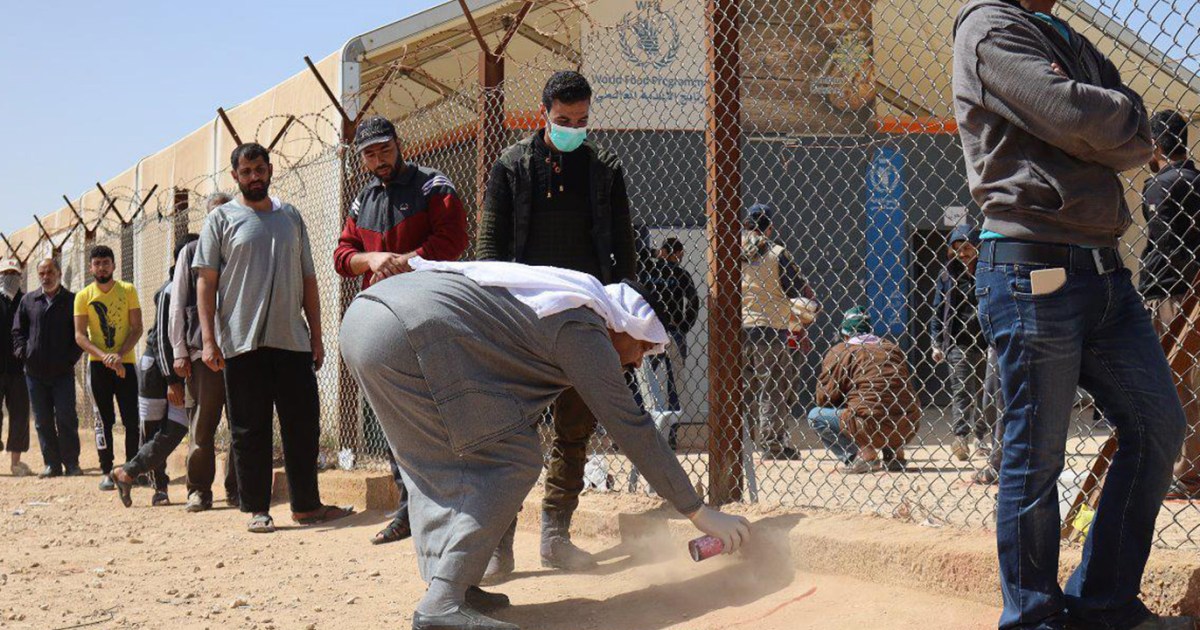There is no way to effectively fight the virus except by reaching the vaccines to the largest possible number of people, and it is likely that breaking the pace of infection spread requires vaccination of at least 70% of the world's population, but is this possible under the current circumstances?
In a report published by the British newspaper "The Independent", writer Bill Tru says that there are many problems facing Covid-19 vaccines reaching the largest number of people around the world, as governments have announced that they will give priority to their citizens, and this is understandable, but This presents a real dilemma for those who do not have countries to protect them or who do not have any nationality at all.
A pioneering Jordanian move
According to the author, Jordan was an example for all countries of the world this week, as it became one of the first countries to administer the vaccine to refugees within its borders.
Jordan hosts about 750 thousand refugees registered with the United Nations High Commissioner for Refugees, and 2.3 million Palestinian refugees under the auspices of the United Nations Relief and Works Agency for Palestine Refugees in the Near East.
The author adds that despite the tremendous pressures facing the country, the authorities decided within their plan to vaccinate against the Coronavirus that anyone living on Jordanian territory - including refugees and asylum seekers - is entitled to receive the vaccine free of charge.
Raya and her husband Ziyad - two Iraqis who fled to Jordan in 2006 - received the Corona virus vaccine last Thursday, and they received priority due to the husband's suffering from chronic diseases, which put him in the category of people at high risk.
"When I go home I can kiss my children without sterilization, we just want life to return to normal, and the vaccine is the appropriate way to do that," says Ria with relief.
The author believes that the countries of the world - especially the rich countries - should follow in the footsteps of Jordan by integrating refugees, internally displaced persons and stateless persons within their national health plans to vaccinate against the Coronavirus, and also provide the required support to host countries that may not have sufficient capabilities to help the displaced who They live within its borders.
"Jordan has been a great example, and other countries should follow suit, but they also need support to be able to do so and to meet the urgent need to leave no one behind," says a UNHCR spokesperson.
According to the author's opinion, helping these groups is not only a moral responsibility, but a global necessity to protect people in various parts of the world from this epidemic, which was confirmed by United Nations officials.
Fair distribution of vaccines
The United Nations High Commissioner for Refugees confirms that it is currently working to ensure that about 80 million displaced persons in more than 100 countries are included in plans to obtain vaccines and treatments for Covid-19, including about 29.6 million refugees.
The author stresses that this task appears to be very difficult, as more than 85% of the world's refugees live in developing countries that are currently struggling to pay for vaccines to vaccinate their citizens, as well as the great logistical difficulties they face in the process of transporting vaccines, where they need to be stored. And transport in cold temperatures.
The author says that the main mechanism for working to solve this problem is the "Kovacs" program supervised by the World Health Organization, which aims to combat "the monopoly of vaccines" and ensure that they reach all countries in the world quickly and fairly.
And last month, the World Health Organization said that the Kovacs program needs to raise an additional 6.8 billion dollars this year, to ensure that vaccines reach the largest number of the world's population.
In light of the difficulty of achieving this goal through the currently allocated sums, the UN agencies - including the United Nations High Commissioner for Refugees - called on all countries to intervene and provide support.
Of the 90 countries currently preparing government strategies and plans for vaccination against the Covid-19 virus, the United Nations High Commissioner for Refugees says that only about half of these countries have included refugees in their plans.
In this context, the United Kingdom announced that all residents - including asylum seekers and refugees - will be part of the government's vaccination process that has already begun.
Last year, Britain granted $ 26.5 million in response to the appeal of the United Nations High Commissioner for Refugees.
The Commission hopes that all countries will take similar steps, and provide more financial support to secure the widespread distribution of vaccines.
There are also calls for rich countries to donate a percentage of the vaccines that they got to build emergency stocks for the coming period.

